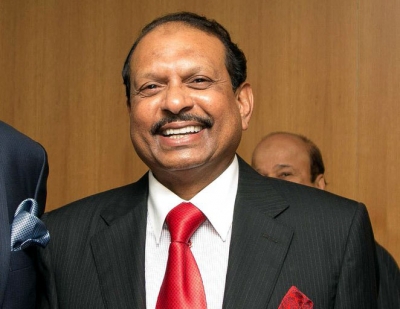Business
Lulu Group plans to invest Rs.3,500 cr in Telangana

UAE-based retailer Lulu Group, which is all set to enter Telangana with its first Lulu Mall and Hypermarket, plans to invest Rs.3,500 crore in the state over the next five years.
Lulu group Chairman Yusuff Ali told a news conference here on Monday that Lulu Mall and Hypermarket in Hyderabad is likely to be inaugurated in August.
He said that the first project in Hyderabad is part of Rs. 500 crore investment that Lulu committed to the state.
With an investment of Rs 300 crore, the 5 lakh square feet mall will offer international shopping experience to the people of Hyderabad and its surrounding areas.
Earlier known as Manjeera Mall, it will be rebranded as Lulu Mall. It will host a mega Lulu Hypermarket with more than 75 local and international brands, 5 screen cinema with a seating capacity of 1,400, multi cuisine food court, and children’s entertainment centre.
Located at Kukatpally, the mall will generate employment for more than 2,000 personal.
Lulu Hypermarket will offer an extensive range of fresh produce and grocery and will have separate sections for fashion, home appliances, electronics, mobiles, IT, and lifestyle products under the brand names, ‘Lulu Fashion Store’ and ‘Lulu Connect.
There will also be special sections to support and promote the local Telangana based agricultural and trade sectors, to further boost the employment opportunity for local youth.
The Lulu Group will make an additional investment of Rs. 200 crore in an export-oriented modern integrated meat processing plant at Chengicherla with a production capacity of 60 tonnes per day. The project will generate employment for more than 2,500 people. Commercial operations are expected to start at the facility in the next 18 months.
Yusuff Ali said that Lulu Group’s investment in the state is the outcome of several discussions and an MoU it signed with the government of Telangana during industry minister K.T. Rama Rao’s visit to the World Economic Forum last year in Davos.
The Lulu Group also plans to invest another Rs 3,500 crore in Telangana over the next fives, including Destination shopping mall in Hyderabad with the investment of Rs 2,000 crore and Mini malls on the outskirts of Hyderabad and other major cities and towns in the state with an investment outlay of Rs 1,000 crore.
Lulu group also plans an agriculture sourcing and logistics hub near the Hyderabad Airport for facilitating exports and promotion of local Telangana produce across India and the world.
Other plans include a seafood procurement and processing center to support the fishing industry.
Rama Rao welcomed the investment and hoped that this will boost tourism in Telangana.
Hyderabad is the sixth city after Kochi, Thiruvananthapuram, Bengaluru, Lucknow, and Coimbatore where the group has its presence.
With its more than 250 Hypermarkets and 24 shopping malls across 22 nations, Lulu Group has been expanding rapidly in India with investments in food processing and retail projects in Ahmedabad, Chennai, Srinagar, Greater Noida, Varanasi.
Lulu Group under the Chairmanship of Yusuff Ali MA is headquartered in Abu Dhabi, has been known as a trendsetter of the retail industry in the Middle East and North Africa region.
It operates over 250 hypermarkets and supermarkets and is immensely popular with discerning shoppers across the GCC, Egypt, India, Indonesia, and Malaysia.
It also employs more than 65,000 strong workforce from 42 different nations, and has an annual turnover of $8 billion globally.
Business
Nifty to touch 29,094 in 12 months supported by durable earnings, strong macro backdrop

New Delhi, Dec 19: India’s benchmark index Nifty is expected to touch 29,094 in one year based on long‑term valuation averages and earnings durability, a report said on Friday.
Wealth management firm PL Wealth said in the report that India enters the end of 2025 from a position of relative macro strength with record‑low inflation, a dovish monetary stance, resilient domestic demand and improved corporate earnings visibility.
“In the near term, large-cap stocks remain preferred due to their earnings stability and strong balance sheets, while selective exposure to high-quality mid-cap names is being added as visibility improves,” the wealth management firm cited its strategy.
Over the next 6 to 24 months, the earnings cycle is expected to broaden across consumption, financials, capex-linked sectors and select industrials, supported by benign inflation, lower interest rates and sustained domestic liquidity.
“India’s current macro configuration is among the most constructive we have seen in over a decade,” said Inderbir Singh Jolly, CEO, PL Wealth Management.
While global uncertainties will continue to create short-term volatility, India’s structural strengths—policy reform, financialisaton of savings and improving corporate balance sheets—position it well for sustained long-term growth, Inderbir added.
RBI’s 25 basis‑point cut to a 5.25 per cent policy repo rate lowered its CPI inflation projections and upgraded GDP growth estimates, signalling confidence in the sustainability of domestic demand, the report said.
The firm also noted FY26 GDP growth projection of 7.3 per cent underpinned by robust infrastructure spending, resilient consumption and key policy measures such as GST rationalisation and income-tax cuts.
The FY26 September quarter earnings season delivered broad-based strength, with several sectors—including hospitals, capital goods, cement, electronics manufacturing services, ports, NBFCs and telecom—reporting double-digit growth in EBITDA and profits.
The firm noted that Nifty earnings per share estimates for FY26–FY28 imply an earnings CAGR of nearly 14 per cent. Domestic institutional investors have anchored markets with record net inflows of over Rs 6.8 trillion year‑to‑date.
Business
Indian stock markets open higher amid positive global cues

Mumbai, Dec 19: Indian stock markets opened on a positive note on Friday, taking cues from supportive global markets, even as benchmark indices remained on track to close the week in the red for the third consecutive session.
In early trade, the Sensex was trading at 84,866.06, up 384.25 points or 0.45 per cent at around 9:20 AM.
The Nifty index was also higher, quoting at 25,926.90, up 104 points or 0.4 per cent. The index continues to trade within the 25,700–25,900 range, reflecting trader indecision.
“Immediate resistance is placed at 25,900–26,000, while key supports are seen at 25,700 and 25,600,” analysts said.
Buying interest was seen in several heavyweight stocks. Shares of TMPV, Eternal, Infosys, Power Grid, BEL, Sun Pharma, and Bajaj Finserv gained up to 1.5 per cent and emerged as the top performers on the Sensex.
On the other hand, ICICI Bank and Bharti Airtel were the only stocks trading in the red during early deals.
Sectorally, all indices were trading higher. The Nifty Healthcare index led the gains, rising 1.14 per cent, followed closely by the Nifty Pharma index, which was up 1.1 per cent.
The Nifty Auto index also gained around 0.5 to 0.57 per cent.
The broader markets mirrored the positive sentiment, with the Nifty Midcap index gaining 0.45 per cent, while the Nifty Smallcap index was up 0.47 per cent.
Meanwhile, investors remain cautious ahead of several key global and domestic triggers.
Globally, market participants are keeping an eye on retail sales data from the UK, wage tracker data from the euro area, and the US Federal Reserve’s balance sheet numbers. On the domestic front, investors are awaiting the Reserve Bank of India’s Monetary Policy Committee meeting minutes and the latest foreign exchange reserve data.
In terms of institutional activity, foreign institutional investors turned net buyers, purchasing shares worth Rs 614.26 crore on Thursday.
Domestic institutional investors also supported the market, with net purchases of Rs 2,525.98 crore during the same session.
Business
India reaches 709 million active UPI QRs, logs 59.33 billion transactions in July-Sep

Mumbai, Dec 18: The unified payments interface (UPI) transaction volumes rose 33.5 per cent (year-on-year) to 59.33 billion transactions in the July-September period, as transaction value grew 21 per cent to Rs 74.84 lakh crore, a report showed on Thursday.
India reached 709 million active UPI QRs, marking a 21 per cent increase since July 2024. Dense QR acceptance across kiranas, pharmacies, transport hubs, and rural markets has made scan-and-pay the default payment mode nationwide, according to the report by Worldline India.
Person-to-merchant (P2M) transactions continued to outpace person-to-person (P2P), reflecting UPI’s dominance in everyday retail payments.
P2M transactions were up 35 per cent to 37.46 billion transactions while P2P transactions rose 29 per cent to 21.65 billion transactions, the report said.
The third quarter (Q3 2025) further reinforced India’s position as the world’s most dynamic real-time payments economy — where every scan, tap, and click is reshaping consumer and merchant behaviour.
The average ticket size declined to Rs 1,262 (from Rs 1,363), highlighting increased usage for micro-transactions such as mobility, food, healthcare essentials, and hyperlocal commerce.
Point of sale (PoS) terminals grew 35 per cent to 12.12 million (July 2024–July 2025). Bharat QR stood at 6.10 million, witnessing marginal decline amid the shift toward UPI QR dominance.
Private banks led acceptance deployment, accounting for 84 per cent market share. While credit card issuance grew by 8 per cent (on-year) to 113.39 million cards, debit cards reached 1.02 billion and prepaid cards stood at 470.1 million.
Credit card transactions grew 26 per cent to 1.45 billion, with transaction value at Rs 6.07 lakh crore. Debit card transactions declined 22 per cent, reflecting migration of low-ticket spends to UPI, the report showed.
Mobile and tap-based payments continued to accelerate, with contactless adoption gaining momentum across metros, mobility services, and quick-service retail.
“The outlook for Q4 2025 and early 2026 points to accelerated innovation and deeper ecosystem integration. Interoperable QR is expected to move from pilot phases to everyday usage across mobility, healthcare, fuel stations, and public utilities—delivering a unified scan-and-pay experience,” the report mentioned.
-

 Crime3 years ago
Crime3 years agoClass 10 student jumps to death in Jaipur
-

 Maharashtra1 year ago
Maharashtra1 year agoMumbai Local Train Update: Central Railway’s New Timetable Comes Into Effect; Check Full List Of Revised Timings & Stations
-

 Maharashtra1 year ago
Maharashtra1 year agoMumbai To Go Toll-Free Tonight! Maharashtra Govt Announces Complete Toll Waiver For Light Motor Vehicles At All 5 Entry Points Of City
-

 Maharashtra1 year ago
Maharashtra1 year agoFalse photo of Imtiaz Jaleel’s rally, exposing the fooling conspiracy
-

 National News1 year ago
National News1 year agoMinistry of Railways rolls out Special Drive 4.0 with focus on digitisation, cleanliness, inclusiveness and grievance redressal
-

 Maharashtra1 year ago
Maharashtra1 year agoMaharashtra Elections 2024: Mumbai Metro & BEST Services Extended Till Midnight On Voting Day
-

 National News1 year ago
National News1 year agoJ&K: 4 Jawans Killed, 28 Injured After Bus Carrying BSF Personnel For Poll Duty Falls Into Gorge In Budgam; Terrifying Visuals Surface
-

 Crime1 year ago
Crime1 year agoBaba Siddique Murder: Mumbai Police Unable To Get Lawrence Bishnoi Custody Due To Home Ministry Order, Says Report












